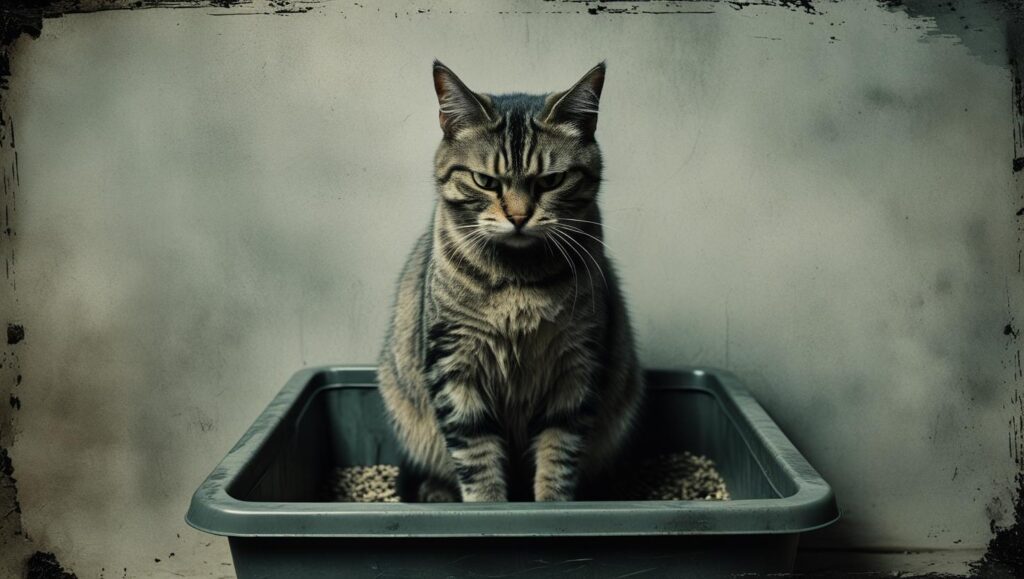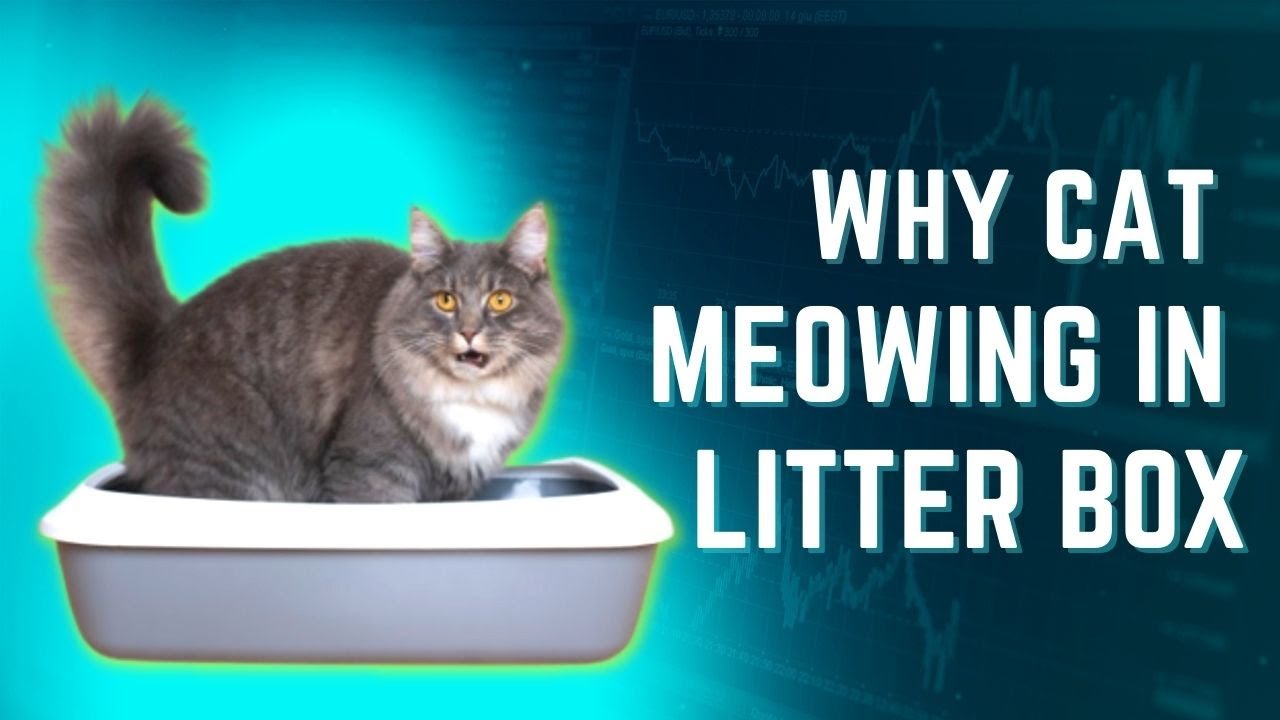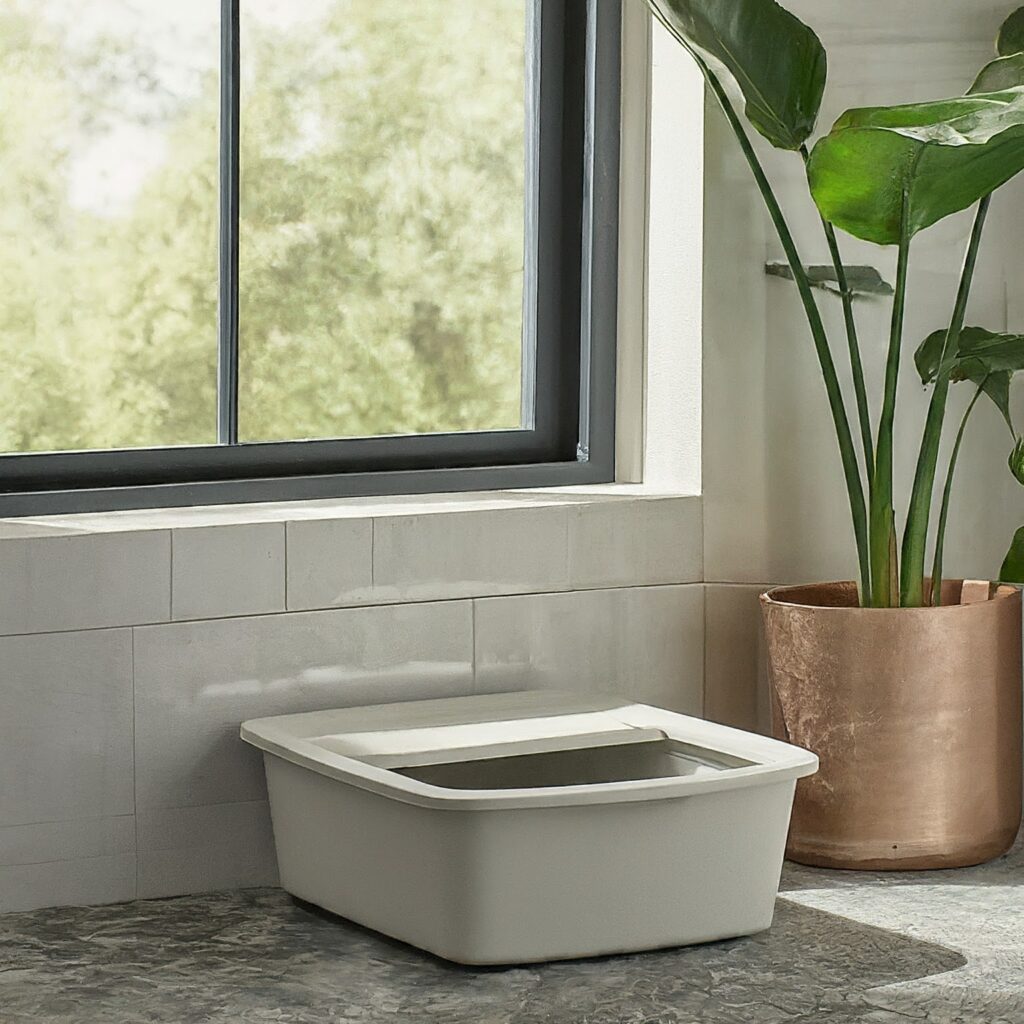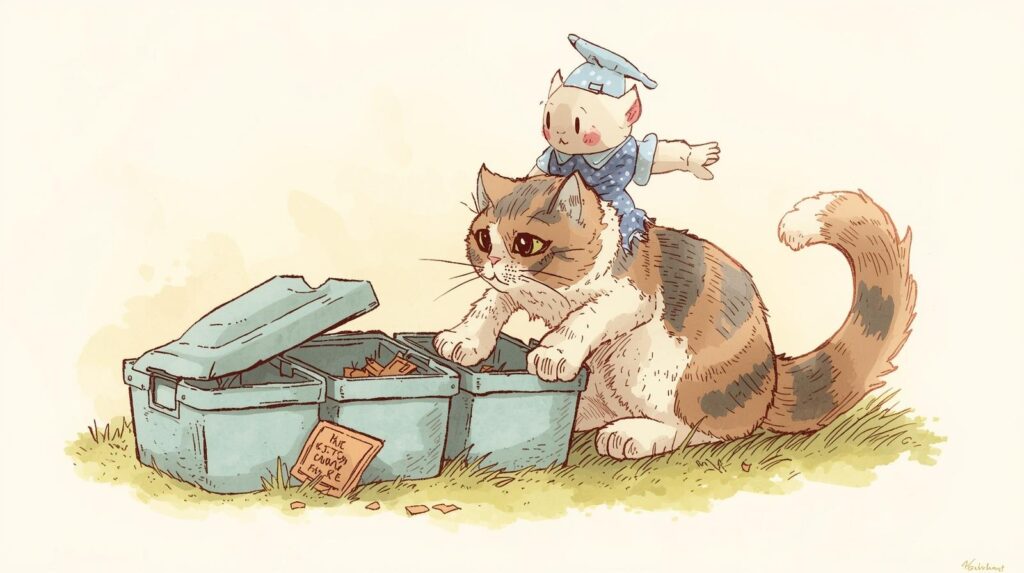
If you notice your cat crying in litter box, it’s often a sign something’s wrong—ranging from a dirty box and urinary infections to stress, pain, or even behavioral issues. Cats rarely vocalize during bathroom time unless they’re experiencing discomfort or emotional distress. As explained in The Cat’s Meow! Caterwauling in Cats, vocalization changes can indicate pain, urinary tract infections, or emotional distress. Understanding these signals early can help you get your cat the care it needs before the problem gets worse.
In this guide, we’ll break down 14 possible reasons and solutions so you can help your cat feel comfortable and healthy again. Kindly read full content that very helpful for your furry friend.
Table of Contents
Why Is My Cat Whining in the Litter Box?
If you notice your cat crying in the litter box, it’s a clear sign something isn’t right. Cats usually use the litter box silently, so whining, yowling, or meowing while urinating or defecating is often linked to pain, discomfort, or stress.
The most common reasons include:
- Urinary Tract Infection (UTI) – This is one of the top causes of cats crying while peeing. A UTI can make urination painful, leading to frequent attempts to pee, sometimes producing only a few drops.
- Urinary Blockage – In male cats especially, a blocked urethra is life-threatening and requires emergency vet care. If your cat strains in the litter box without producing urine, call your vet immediately.
- Bladder Stones or Crystals – These cause irritation and pain inside the urinary tract, making cats vocal in the litter box.
- Constipation – If your cat cries while pooping, it might be struggling with hard stools or digestive issues.
- Stress or Anxiety – Changes at home, new pets, or litter box location changes can make a cat associate the litter box with stress.
- Arthritis or Mobility Issues – Senior cats may cry when entering or exiting the litter box if stepping in causes joint pain.
Do Cats Meow When Their Litter Box Is Dirty?

Yes — many cats will meow, cry, or even yowl when their litter box isn’t clean. Felines are naturally clean creatures, and a dirty litter box can make them feel uncomfortable, stressed, and even unsafe. This is one of the most common reasons for cat crying in litter box situations.
A dirty litter box doesn’t just cause vocalization; it can lead to behavioral changes such as avoiding the box altogether, urinating outside it, or digging excessively without doing their business.
Why Cats Meow When the Litter Box Is Dirty:
- Discomfort and hygiene concerns – Cats are instinctively clean and dislike stepping on soiled litter.
- Territorial signals – In multi-cat homes, a dirty box can be a sign of dominance or neglect from another cat.
- Health issues – Urinary tract infections, constipation, or bladder inflammation can make using a dirty box painful, causing excessive meowing.
- Stress triggers – A strong ammonia odor from old urine can irritate a cat’s respiratory system, leading to meowing or whining before they attempt to use the box.
Signs Your Cat’s Litter Box Is Too Dirty:
- Persistent meowing before or after entering the box.
- Scratching excessively around the box but not eliminating.
- Refusing to cover waste — a sign they’re dissatisfied with the box’s cleanliness.
- Going to the box multiple times without using it.
How to Solve This Problem:
- Scoop the litter box daily — ideally twice a day for multiple cats.
- Change the litter completely every 1–2 weeks and wash the box with a mild, unscented soap.
- Use low-dust, unscented litter to avoid respiratory irritation.
- Consider adding extra litter boxes in multi-cat households to reduce competition.
Pro Tip: If your cat continues meowing even with a clean litter box, it might not be the cleanliness — it could be medical pain, stress, or a territorial issue. In such cases, a vet check is essential.
Can Pain or Discomfort Cause a Cat to Cry in the Litter Box?
Yes — pain or discomfort is one of the most common reasons for cat crying in litter box behavior, and it’s something cat owners should take seriously. When a cat experiences urinary tract infections (UTIs), bladder stones, or even constipation, using the litter box can become painful. As a result, they may meow loudly, whine, or even yowl during or after using it.
Cats can’t tell you where it hurts, so crying while eliminating is often their way of signaling that something is wrong. Ignoring these signs can lead to serious health issues.
Common Health Problems Behind This Behavior:
- Urinary Tract Infections (UTIs) – These can cause burning pain during urination, leading to meowing or whining in the box.
- Feline Lower Urinary Tract Disease (FLUTD) – A painful condition that makes urination difficult.
- Constipation – Straining to poop can cause loud crying.
- Kidney Disease – May lead to frequent and uncomfortable urination.
- Arthritis – Getting into or squatting in the litter box may cause discomfort in older cats.
How to Tell If Pain Is the Cause:
Look for these warning signs alongside the cat crying in litter box:
- Straining without producing much urine or stool
- Blood in urine or feces
- Frequent trips to the litter box with little output
- Over-grooming the genital area
- Sudden aggression or hiding after litter box visits
What to Do Next:
If you suspect your cat is in pain:
- Visit your vet immediately – Health issues like UTIs or bladder stones need fast treatment.
- Keep the litter box accessible – Use low-entry boxes for senior or arthritic cats.
- Monitor changes – Track meowing frequency and litter box habits to help your vet diagnose the issue.
Pro Tip: Many readers searching for this topic also look for answers to “Why Is My Cat Meowing So Much?” — and pain during elimination can be one of the top reasons.
Can Medical Issues Cause Cat Crying in Litter Box?
Yes — sometimes, cat crying in litter box behavior isn’t about litter cleanliness or habits. It’s a red flag for underlying health issues that need attention. Cats are masters at hiding pain, so vocalizing in the litter box is often one of the first obvious signs that something is wrong.
Here are the most common medical reasons your cat might cry while using the litter box:
- Urinary Tract Infections (UTIs) – These cause pain, burning, and frequent urges to urinate. Cats may strain in the litter box and cry due to discomfort.
- Bladder Stones or Crystals – Sharp urinary crystals can block the urethra, especially in male cats. This is a life-threatening emergency and needs immediate vet care.
- Constipation – If your cat has hard stools or can’t pass waste easily, they might cry from the pain and strain.
- Arthritis or Joint Pain – Older cats may cry because stepping into or crouching in the litter box hurts their joints.
- Kidney Disease – Chronic kidney problems can make urination more frequent and painful, leading to meowing in the litter box.
Pro Tip: If your cat shows other symptoms like frequent trips to the litter box, blood in urine, or licking the genital area excessively, see a vet immediately. Medical conditions related to urination can become life-threatening within hours.
Is Stress Making Your Cat Cry in the Litter Box?

Yes — stress and anxiety can absolutely cause cat crying in litter box behavior, even when there’s no medical problem. Cats are highly sensitive creatures, and changes in their environment or routine can trigger emotional distress that shows up in their bathroom habits.
Here are the most common stress-related triggers:
- New Environment or Moving – Relocating to a new home can make a cat feel insecure, causing them to vocalize in the litter box as a way of expressing anxiety.
- New Pets or People – Introducing a new cat, dog, or even a new baby can cause territorial stress, making the litter box a place of tension.
- Dirty or Unfamiliar Litter – Switching cat litter brands or letting the box stay dirty can unsettle a cat’s comfort zone.
- Changes in Routine – Cats thrive on routine. Sudden changes in feeding time, playtime, or where the litter box is located can lead to stress-related crying.
- Territorial Conflicts – Multi-cat households can have quiet tension. A dominant cat may block another from accessing the litter box peacefully.
Pro Tip: Keep your cat’s environment predictable. Maintain the same litter box location, clean it daily, and avoid sudden changes in litter type. If you must switch litter, do it gradually over a week to reduce stress.
Could Constipation or Straining Be the Reason?
Absolutely. Constipation is one of the most overlooked causes of cat crying in litter box episodes. When a cat struggles to pass stool, the effort can be painful — leading to loud meows or distressed yowls during the process.
Common Causes of Cat Constipation
- Low Water Intake – Cats that don’t drink enough water often develop hard, dry stools.
- Low-Fiber Diet – A diet without enough moisture or fiber can slow down digestion.
- Obesity – Overweight cats may have reduced activity, which affects bowel movement regularity.
- Hairballs – Especially in long-haired breeds, hair accumulation can create blockages.
- Underlying Medical Issues – Conditions like arthritis can make squatting painful, adding to the discomfort.
Signs Your Cat Might Be Constipated
- Small, hard, or pellet-like stools in the litter box
- Straining or spending more time than usual in the box
- Skipping bathroom trips for more than 48 hours
- Vocalizing in pain or frustration while inside the box
Pro Tip: Encourage hydration by offering multiple water bowls, a pet fountain, or even wet food. If your cat’s constipation persists, a vet visit is essential — chronic straining can lead to more serious issues like megacolon.
Could a Bladder Infection or Urinary Tract Problem Be the Culprit?
Yes — urinary tract infections (UTIs) and bladder problems are a major reason for cat crying in litter box situations. When the urinary tract becomes inflamed or infected, even a small attempt to urinate can cause sharp pain, leading to crying, yowling, or restless behavior in and around the litter box.
Common Urinary Tract Issues in Cats
- UTIs (Urinary Tract Infections) – Caused by bacteria entering the bladder, leading to pain and frequent urination attempts.
- Feline Lower Urinary Tract Disease (FLUTD) – An umbrella term for urinary conditions that cause discomfort, urgency, and straining.
- Bladder Stones or Crystals – Mineral buildup that can partially or fully block urine flow.
- Urethral Obstruction – More common in male cats; this is a medical emergency that can be life-threatening within 24–48 hours.
Warning Signs to Watch For
- Visiting the litter box repeatedly but producing little or no urine
- Vocalizing or meowing loudly during urination
- Blood-tinged urine or strong ammonia-like odor
- Excessive licking of the genital area
- Restlessness, pacing, or hiding due to discomfort
Why You Should Act Fast
Urinary issues can escalate quickly. In male cats especially, blockages can cause kidney damage and even death if untreated. Female cats can also suffer severe complications if infections spread to the kidneys.
Pro Tip: If you notice sudden changes in bathroom habits or crying in the litter box, seek veterinary help immediately. Early diagnosis and treatment can prevent complications and save your cat’s life.
Why Does My Cat Meow While Digging in the Litter Box?
If your cat starts meowing while digging in the litter box, it’s more than just quirky behavior — it’s their way of sending you a message. Cats often use vocal cues to communicate discomfort, excitement, or even anxiety during litter box time.
Here are the most common reasons for this behavior:
- Marking territory — Some cats make noises while digging as a form of claiming their space, especially in multi-cat households.
- Excitement or playfulness — Kittens and young cats may meow because they find the digging process stimulating.
- Discomfort or irritation — If the cat litter texture is too rough or dusty, your cat may vocalize while pawing at it.
- Health issues — Urinary tract infections or mild constipation can cause both digging and meowing due to discomfort.
- Stress triggers — Loud noises, new pets, or recent changes in the home can lead to anxious meowing during litter box use.
Pro Tip: If your cat’s digging-and-meowing routine is new or paired with other symptoms like frequent trips to the litter box, seek veterinary advice immediately to rule out urinary health problems.
How to Stop Your Cat from Spending Too Much Time in the Litter Box
If your cat seems glued to the litter box, it’s not just a quirky habit — it can be a warning sign. While a short visit is normal, extended or repeated stays often point to health problems or behavioral stress.
Possible Causes:
- Urinary or digestive issues — Conditions like UTIs, bladder stones, or constipation can cause cats to linger.
- Stress and anxiety — A recent move, a new pet, or even a change in the cat litter type can disrupt normal behavior.
- Territorial behavior — In multi-cat homes, some cats guard the litter box to assert dominance.
Solutions That Work:
- Schedule a vet visit — Always rule out medical conditions first.
- Upgrade the litter box setup — Ensure it’s clean, placed in a quiet spot, and sized appropriately for your cat.
- Use the right cat litter — Opt for a soft, low-dust, and unscented variety to prevent irritation.
- Reduce stress — Create safe spaces, use calming diffusers, and maintain a consistent routine.
Pro Tip: If you have multiple cats, follow the “how many litter boxes per cat” rule to prevent competition and anxiety.
By addressing both medical and environmental causes, you can help your cat return to normal bathroom habits — and avoid long, unnecessary litter box stays that could lead to bigger health concerns.
What Is the Best Enzymatic Cleaner for Cat Urine?
When dealing with cat urine, regular cleaners won’t cut it. The uric acid crystals in urine are non-water-soluble, meaning they keep producing that strong ammonia smell unless broken down by enzymes. That’s where an enzymatic cleaner comes in — it doesn’t just mask odors, it eliminates them at a molecular level.
Why Enzymatic Cleaners Work Best:
- Break down uric acid — Permanently removes the source of the smell.
- Safe for pets — Non-toxic formulas mean no harmful chemicals near your cat.
- Prevents repeat accidents — Cats often return to the same spot if the smell lingers.
- Effective on multiple surfaces — Works on carpets, hardwood, tile, and even fabric.
Top Features to Look For:
- Pet-safe formula — Always choose one labeled safe for cats.
- Multi-surface usability — Versatility means you can tackle litter box spills, furniture accidents, and more.
- Fast-acting enzymes — Shorter wait time before the smell is gone.
- Odor-blocking technology — Neutralizes ammonia and discourages marking.
Pro Tip: For litter box areas, first remove soiled cat litter, scrub with warm water, then apply the enzymatic cleaner. Let it soak for at least 10–15 minutes before blotting dry for maximum effect.
Why Does My Cat Meow at the Litter Box at Night?
If your cat is meowing at the litter box at night, it can be puzzling and even keep you awake. Cats are naturally more active during dusk and dawn, but nighttime meowing near the litter box usually signals something more specific. Understanding the cause can help you take the right action quickly.
Possible reasons for nighttime litter box meowing:
- Discomfort or pain – Cats with urinary tract infections, bladder inflammation, or constipation may vocalize when trying to use the litter box.
- Dirty litter box – If the box wasn’t cleaned before bed, your cat might be calling for you to take care of it.
- Stress or insecurity – Noises, new pets, or changes in the household can make cats restless at night. They may approach their litter box and vocalize as a form of self-soothing.
- Attention-seeking – Some cats learn that nighttime meows get them human attention, especially if you’ve responded in the past.
Tip: If your cat’s nighttime litter box meowing is new and persistent, don’t delay a vet visit. Feline urinary issues can worsen rapidly and require immediate attention.
Why Is My Cat Meowing So Much?
Cats meow for many reasons, and while some vocalization is completely normal, excessive meowing can signal that something isn’t quite right. Understanding why your cat is suddenly more talkative can help you respond appropriately and keep them happy — and healthy.
Here are the most common reasons behind nonstop meowing:
- Hunger or Thirst Needs
Cats are masters at reminding you when it’s mealtime. If your cat meows loudly near their food bowl or water dish, it could be a direct request for a refill. Keeping a consistent feeding schedule and fresh water supply can reduce food-related vocalization. - Dirty Litter Box Frustration
A dirty litter box can make even the quietest cat complain. Strong odors, clumped waste, or an overcrowded box (if you have multiple cats) can trigger loud meowing to get your attention. A quick clean-up often quiets the protest. - Health Issues
Frequent or unusual meows — especially when paired with litter box trouble, limping, or loss of appetite — may point to medical problems like urinary tract infections, kidney disease, or hyperthyroidism. If in doubt, a vet check is the safest choice. - Stress or Anxiety
Cats are sensitive to changes in their environment. A recent move, new pet, loud noises, or even a change in litter box location can make them meow more as they try to express discomfort. - Attention-Seeking Behavior
Some cats learn that meowing gets them what they want — cuddles, playtime, or treats. While it’s tempting to give in, rewarding constant meowing can reinforce the habit. Balance attention with quiet time. - Aging and Cognitive Changes
Senior cats may develop cognitive dysfunction, leading to disoriented meowing, especially at night. In such cases, environmental adjustments and veterinary advice can help.
Tip: Keep a meowing diary for a week — note the time, situation, and your cat’s behavior. Patterns will often reveal whether the meowing is linked to food, the litter box, playtime, or stress.
The Cat’s Meow! Caterwauling in Cats
Caterwauling is that loud, almost wailing sound that can make any cat owner stop in their tracks. Unlike a normal meow, caterwauling is more intense, drawn out, and often filled with urgency. It’s a cat’s way of saying, “Something is seriously going on!” Understanding why your cat is caterwauling is key to responding appropriately and keeping them happy and healthy.
Common Reasons Cats Caterwaul
- Mating Behavior: Unspayed or unneutered cats often caterwaul to attract mates, especially during heat cycles.
- Pain or Discomfort: Conditions like urinary tract infections, arthritis, or digestive issues can trigger a deep, urgent cry.
- Stress or Anxiety: Changes like moving furniture, adding a new pet, or being left alone too long can cause loud vocalizations.
- Territorial Concerns: If a cat sees another cat outside the window, their territorial instincts may kick in.
- Cognitive Decline in Senior Cats: Older cats with feline dementia (cognitive dysfunction syndrome) may vocalize excessively at night.
Pro Tip: Caterwauling isn’t just “annoying cat talk.” It’s communication. The sooner you identify the cause, the faster you can restore peace for both you and your feline friend.
When to See the Vet for Cat Crying in Litter Box
Seek immediate veterinary help if your cat:
- Cries while urinating or defecating
- Produces little or no waste
- Shows signs of pain
Prompt care can prevent serious complications.
Pro Tips to Prevent Cat Crying in Litter Box
- Keep it clean: Scoop daily and refresh litter weekly.
- Choose the right litter: Unscented, soft-textured litter is best for sensitive paws.
- Provide multiple boxes: One per cat, plus one extra.
FAQs About Cat Crying in Litter Box
Why is my male kitten meowing in litter box?
A male kitten meowing in litter box could be trying to tell you something. Kittens often cry if they are uncomfortable, scared, or having trouble using the litter box. It can also happen if the cat litter feels strange on their paws or if they are constipated. Make sure the box is clean, the litter is soft, and your kitten is healthy. If the meowing continues, a vet visit can rule out infections or digestive problems.
I saw a post about cat crying in litter box reddit – is this normal?
Many cat crying in litter box reddit discussions point to two main reasons: discomfort or pain. Cats may cry if the litter is too dirty, has a strong scent, or if they are dealing with urinary or bowel issues. Since this behavior can be linked to health problems like urinary tract infections (UTIs), it’s best to get your cat checked by a vet quickly.
Why is my female cat crying in litter box?
A female cat crying in litter box might be in heat, feeling stressed, or having trouble passing urine. Sometimes, female cats develop bladder inflammation (cystitis) which can cause pain during urination. Keep an eye out for signs like frequent trips to the box, straining, or blood in the urine, as these require immediate veterinary care.
Why is my male cat meowing so much all of a sudden?
If your male cat meowing so much all of a sudden isn’t related to the litter box, it could be caused by hunger, attention-seeking, or stress. However, sudden excessive meowing can also mean pain or illness. Changes in behavior should be taken seriously, especially if your cat is usually quiet.
What does it mean when a stray cat crying in litter box?
A stray cat crying in litter box may be new to indoor life and feel unsure about using it. They might also be dealing with dehydration, malnutrition, or untreated medical conditions. Offering a quiet space, fresh water, and a clean cat litter area can help them feel safe while you arrange a vet check-up.
Why is my female cat meowing so much all of a sudden?
When a female cat meowing so much all of a sudden is paired with restlessness, it often means she’s in heat. If she’s spayed, this behavior could be stress-related or due to illness. Monitor for other symptoms like changes in eating, litter habits, or grooming patterns to find the cause.
Why does my cat howl before and after using litter box?
If you notice your cat howling before and after using the litter box, it might be due to discomfort from constipation, UTIs, or even arthritis making it hard to squat. This behavior is a big red flag for possible pain, so a vet visit is highly recommended.
Why is my cat meowing so much all of a sudden at night?
A cat meowing so much all of a sudden at night may be bored, lonely, or sensing changes in the environment. Older cats may develop cognitive dysfunction (similar to dementia), which can cause nighttime vocalization. Providing stimulation during the day and a calm bedtime routine can help reduce late-night noise.
Further reading
Wrapping Up
If your cat is suddenly meowing in the litter box, it’s their way of telling you something isn’t right — whether it’s discomfort, a medical issue, or simply stress. By paying attention to signs like male kitten meowing in litter box, female cat crying in litter box, or even a stray cat crying in litter box, you can take quick action and ensure their comfort.
The key takeaway? Never ignore changes in your cat’s litter box behavior. A sudden shift — like when your male cat is meowing so much all of a sudden or your female cat starts meowing at night — can indicate anything from a urinary tract infection to anxiety.
Here are the most important points to remember:
- Observe patterns – If your cat howls before or after using the litter box, note the frequency and timing.
- Check for health problems – Cats can’t tell you they’re in pain, so sudden crying could mean a vet visit is necessary.
- Consider emotional triggers – Loud noises, new pets, or changes at home can make a cat vocal in the litter box.
- Don’t wait – Early attention can prevent bigger problems, especially with urinary or digestive issues.
By staying alert and proactive, you’ll not only keep your cat healthy but also strengthen your bond. Remember — your cat’s voice, even when it’s a persistent meow in the litter box, is always worth listening to.




